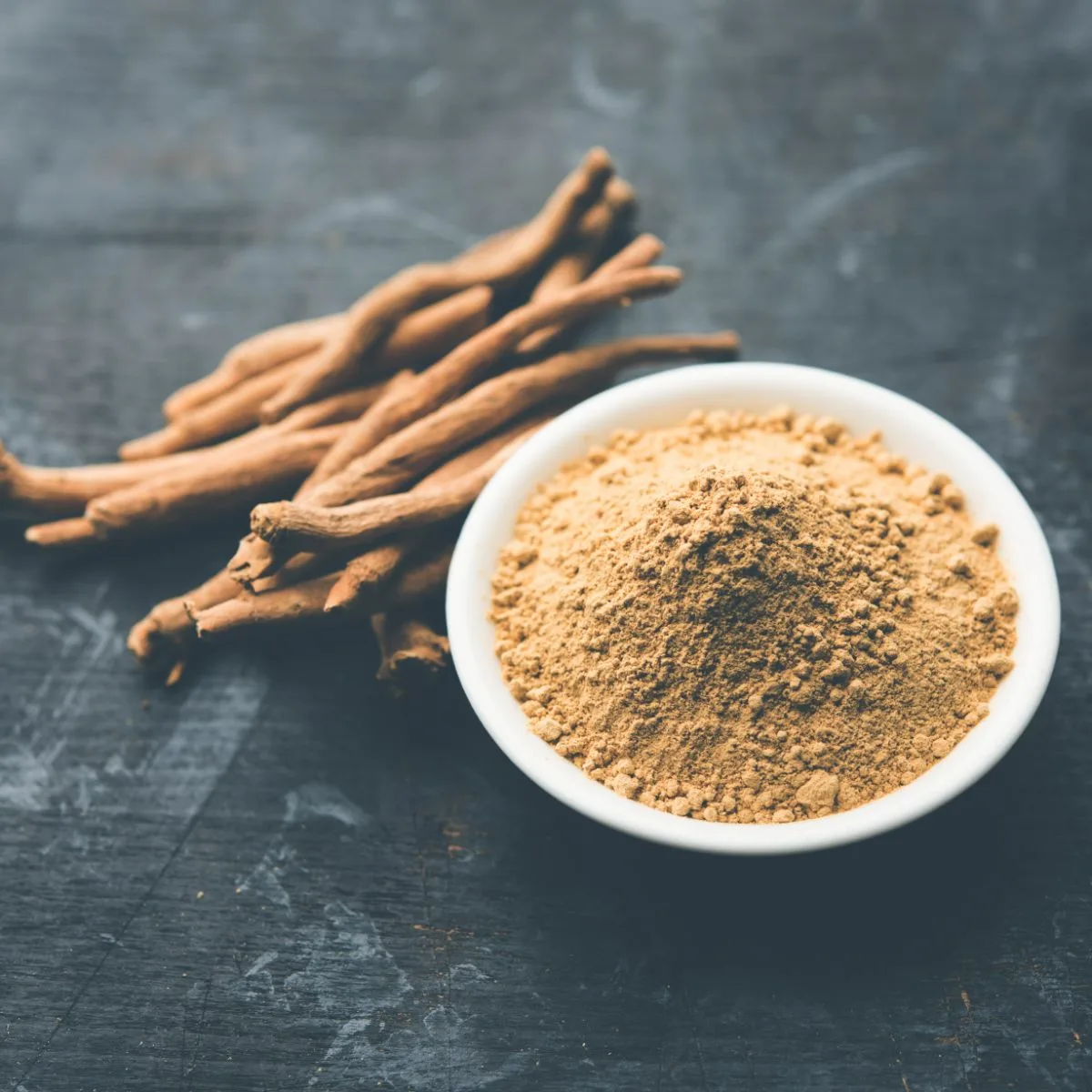Ashwagandha (Withania somnifera), often hailed as the king of Ayurvedic herbs, has gained immense popularity in recent years for its numerous health benefits.
Traditionally used in Indian medicine for centuries, ashwagandha is celebrated for its adaptogenic properties, which help the body manage stress, anxiety, and fatigue. However, like any powerful medicinal herb, ashwagandha is not without its side effects.
While much of the spotlight is often on the positive attributes of this herb, it is equally important to delve into the potential adverse effects to make informed decisions about its usage.
Ashwagandha – Possible Side Effects:
The Impact on Thyroid Function: Overstimulation and Potential Risks
Ashwagandha is known for its ability to influence thyroid function, often touted as beneficial for those with hypothyroidism.
The herb can increase the levels of thyroid hormones, particularly T3 and T4, which is generally seen as a positive effect for individuals with an underactive thyroid. However, this stimulation can become a double-edged sword.
For those with normal thyroid function or undiagnosed hyperthyroidism, ashwagandha could potentially lead to an overproduction of thyroid hormones.
This can result in symptoms of hyperthyroidism, such as rapid heartbeat, anxiety, weight loss, and excessive sweating.
Individuals with autoimmune thyroid conditions like Graves’ disease should be particularly cautious. The herb’s immune-boosting properties could exacerbate autoimmune attacks on the thyroid, worsening the condition.
In my experience, even small doses of ashwagandha can significantly alter thyroid function in sensitive individuals, and it’s crucial to monitor thyroid levels regularly if you decide to incorporate this herb into your regimen.
Consulting with a healthcare provider before starting ashwagandha, particularly if you have a history of thyroid disorders, is an essential step that cannot be overstated.
Gastrointestinal Distress: Navigating Digestive Challenges
Ashwagandha is generally considered safe for the digestive system, but it can cause discomfort in some individuals, especially when taken in large doses or without adequate preparation.
One of the most commonly reported side effects is gastrointestinal distress, including symptoms such as nausea, stomach cramps, diarrhea, and even vomiting.
These adverse effects may stem from the body’s difficulty in processing the alkaloids and other bioactive compounds present in ashwagandha.
The root of the plant, which is most commonly used in supplements, contains high levels of withanolides, which are believed to be responsible for both its therapeutic effects and some of its side effects.
Taking ashwagandha on an empty stomach can exacerbate these digestive issues, as can combining it with other medications or supplements that irritate the gastrointestinal tract.
To mitigate these side effects, it’s often recommended to take ashwagandha with food, which can help buffer the stomach and reduce irritation.
Starting with a lower dose and gradually increasing it allows your digestive system to adjust, potentially minimizing discomfort.
For individuals with a history of gastrointestinal disorders, such as irritable bowel syndrome (IBS) or gastritis, ashwagandha’s effects on the digestive tract can be particularly pronounced.
In these cases, working closely with a healthcare provider to monitor symptoms and adjust dosages accordingly is vital.
Sleep Disturbances: When Calm Turns into Insomnia
Ashwagandha is often praised for its calming effects, making it a popular choice for those looking to improve sleep quality and reduce insomnia. However, paradoxically, some individuals report experiencing sleep disturbances, including vivid dreams, restlessness, and even insomnia after taking ashwagandha.
The cause of these sleep disturbances isn’t fully understood, but it may be related to the herb’s adaptogenic properties.
While adaptogens help the body resist stress, they can also increase overall alertness and energy levels, particularly if taken in large doses or close to bedtime.
This can lead to an overstimulation of the nervous system, which is counterproductive for those seeking better sleep.
In my observations, timing is crucial when it comes to ashwagandha and sleep.
Taking it earlier in the day may help harness its stress-reducing benefits without interfering with nighttime rest. Additionally, individual responses to ashwagandha can vary widely, with some people finding it extremely sedative, while others may feel a subtle boost in energy that keeps them awake.
For those who experience sleep disturbances, experimenting with the timing and dosage of ashwagandha, or even considering alternative adaptogens like holy basil or reishi mushroom, may provide a more balanced approach to improving sleep quality.
Autoimmune Concerns: Stimulation of the Immune System
Ashwagandha is widely recognized for its immune-boosting properties, which is one of the reasons it has been used in Ayurvedic medicine to enhance vitality and resilience. However, this very characteristic can pose risks for individuals with autoimmune diseases.
Autoimmune diseases, such as lupus, rheumatoid arthritis, and multiple sclerosis, involve the immune system mistakenly attacking the body’s own tissues.
Since ashwagandha can stimulate immune activity, there’s a concern that it could potentially exacerbate these conditions. This immune-enhancing effect could lead to flare-ups, increased inflammation, and a worsening of symptoms in those with autoimmune disorders.
Interestingly, while some studies suggest that ashwagandha might have an immune-modulating effect—meaning it could theoretically balance the immune response rather than just stimulate it—the evidence is not conclusive.
Until more research is conducted, it’s prudent for individuals with autoimmune conditions to approach ashwagandha with caution.
I’ve observed that the effects of ashwagandha on the immune system can be unpredictable in individuals with autoimmune conditions. A personalized approach, including close monitoring and possibly avoiding the herb altogether, is often the safest course of action.
Interactions with Medications: Navigating Complex Combinations
One of the most critical aspects of taking any supplement is understanding how it might interact with other medications or supplements you’re already taking.
Ashwagandha is no exception, and its potential interactions with certain medications are an essential consideration.
Ashwagandha can amplify the effects of medications that lower blood sugar and blood pressure, potentially leading to dangerously low levels.
For individuals on medications like metformin, insulin, or antihypertensive drugs, this interaction could result in symptoms such as dizziness, fainting, or even shock.
Furthermore, ashwagandha might interact with sedatives, anti-anxiety medications, and other CNS (central nervous system) depressants, possibly enhancing their effects and leading to excessive drowsiness or respiratory depression.
There’s also evidence that ashwagandha could affect the metabolism of certain drugs by influencing liver enzymes responsible for drug breakdown, leading to either increased toxicity or reduced effectiveness of these drugs.
Given these potential interactions, it’s crucial to discuss with your healthcare provider before adding ashwagandha to your routine, especially if you’re taking prescription medications.
Even natural supplements can have powerful effects, and understanding these interactions can help prevent adverse reactions.
Reproductive Health: Implications for Fertility and Hormonal Balance
Ashwagandha is often touted for its benefits in enhancing fertility and hormonal balance, particularly in men. However, the effects of this herb on reproductive health can be more complex than they first appear.
In men, ashwagandha is known to increase testosterone levels, which can be beneficial for those experiencing low testosterone or infertility. However, this boost in testosterone might not be ideal for everyone.
Elevated testosterone levels can contribute to issues such as aggressive behavior, mood swings, and an increased risk of certain types of cancer, particularly in those already at risk.
For women, the effects of ashwagandha on reproductive health are less well-studied, but the herb is thought to influence estrogen levels and potentially affect the menstrual cycle.
While some women report improved menstrual regularity and reduced symptoms of premenstrual syndrome (PMS), others may experience disruptions in their cycle, particularly if they have hormone-sensitive conditions like polycystic ovary syndrome (PCOS) or endometriosis.
In my experience, the impact of ashwagandha on reproductive health can vary widely depending on individual hormonal profiles and underlying health conditions.
It’s essential to approach this herb with caution, especially if you’re dealing with fertility issues or hormonal imbalances.
Working with a healthcare provider to tailor the dosage and monitor its effects on your reproductive system is a wise strategy.
Psychological Effects: Mood Alterations and Emotional Responses
Ashwagandha is commonly used to manage stress, anxiety, and depression, thanks to its adaptogenic properties. However, the psychological effects of ashwagandha are not always straightforward, and for some individuals, it may lead to mood alterations that are less than desirable.
While many people experience a calming effect from ashwagandha, others may report feelings of apathy, emotional numbness, or even increased anxiety.
These reactions could be related to how ashwagandha affects neurotransmitter levels in the brain, particularly serotonin and GABA. In some cases, the herb may reduce anxiety too much, leading to a feeling of emotional flatness or a lack of motivation.
Moreover, ashwagandha’s influence on mood can be unpredictable in those with bipolar disorder or a history of manic episodes. The herb’s stimulating effects could potentially trigger mania or hypomania, leading to erratic behavior and heightened emotional states.
In clinical practice, I’ve found that while ashwagandha can be a powerful tool for managing stress and anxiety, it’s essential to monitor its effects closely, particularly if you have a history of mood disorders.
Adjusting the dosage, timing, or even discontinuing use may be necessary to maintain a balanced emotional state.
Long-term Use and Tolerance: The Unknowns of Prolonged Consumption
Ashwagandha is often marketed as a safe, natural supplement that can be taken long-term without significant risks. However, the reality is that the long-term effects of ashwagandha use are not well understood, particularly when taken in high doses or in combination with other supplements and medications.
One concern with long-term use is the potential for the body to develop a tolerance to ashwagandha’s effects. Just as the body can become desensitized to certain medications, prolonged use of adaptogens like ashwagandha might lead to a reduced response over time, requiring higher doses to achieve the same benefits.
This escalation can increase the risk of side effects and may strain the body’s systems, particularly the liver and kidneys, which are responsible for processing the herb.
The impact of long-term ashwagandha use on hormonal balance, particularly thyroid and adrenal hormones, is not fully understood. Chronic use of adaptogens could potentially disrupt the body’s natural hormone production and regulation, leading to imbalances that are difficult to correct.
Final Thoughts
Ashwagandha is a potent herb with a wide range of health benefits, but it’s not without its potential side effects.
Understanding these risks is crucial for anyone considering incorporating ashwagandha into their health regimen.
From its impact on thyroid function to its potential interactions with medications and effects on reproductive health, ashwagandha’s side effects are complex and varied.
By approaching this herb with caution, working closely with a healthcare provider, and monitoring your body’s response, you can maximize its benefits while minimizing potential harm.
READ THIS NEXT:
What Are the Side Effects of Too Much Magnesium?
